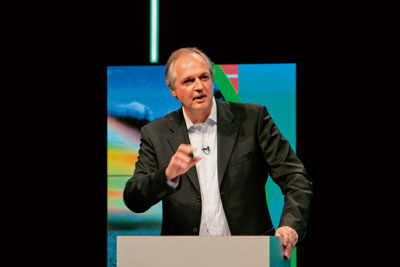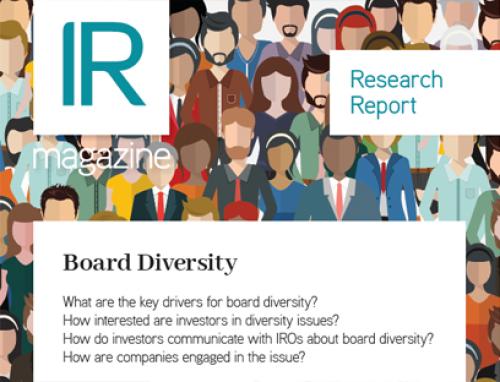Following Paul Polman’s third successive win at the IR Magazine Europe awards, James Chambers catches up with the ‘sustainable’ CEO of Unilever
Paul Polman has now won the best IR by a CEO award three years in a row. Each year, he has pipped a different European competitor into second place, from Royal KPN’s former CEO Ad Scheepbouwer in 2010 to Portugal Telecom’s top executive Zeinal Bava in 2011 and Ian Cheshire from Kingfisher this year.
Polman was appointed CEO of Unilever in January 2009. During his highly decorated tenure as CEO, Unilever has enjoyed a similarly successful three-year run in the IR Magazine Europe Awards: it has been the top company in the UK for three years running, and this year it finally overtook Nestlé – where Polman used to be CFO – to become best in the food & beverages/tobacco sector, an award for which it was runner-up the previous two years. 
Unilever's Paul Polman
What’s more, Unilever is closing in on Nestlé’s best use of technology for IR award, which the Swiss chocolatier has held onto since 2010. Unilever came third in this category in 2010 and 10th in 2011 but this year it comes second – only one point behind Nestlé.
At the end of 2011, Unilever released its first IR app for Apple and Android, unveiling it to investors at the company’s annual IR seminar, which is held each year in a strategically important emerging market (this year’s event was held in Turkey).
For the time being, the one prize eluding Unilever and its trophy-rich CEO is the award for best practice of CSR – a surprising omission when sustainability plays such a central part in Polman’s vision for Unilever’s future growth, as he outlines overleaf. Unilever’s best performance so far has been a fifth place in 2010.
This year, the company finished joint sixth in the category, which saw UK retailer Marks and Spencer Group take first place and the familiar sector stablemate Nestlé come second.
Another year, another best investor relations by a CEO award. Have you been doing anything different this year?
We have not made major changes. The strength of a good strategy is that it withstands the test of time. The efforts we have made to reduce the emphasis on the short term – for example, the move to interim management statements for Q1 and Q3 – are increasingly being appreciated by those with a longer-term investment horizon. As a result we also see the discussions with our investor base around our strategy getting sharper.
We still have some work to do to ensure the investment community fully appreciates the Unilever sustainable living plan as our business model. I will always make time in my agenda to meet and discuss the business with investors on a regular basis.
Has Unilever’s sustainable living plan been overshadowed by the eurozone debt crisis?
The financial crisis and now the eurozone debt crisis have taken many people’s eye off the sustainability ball in the short term, yet the two are related. Europe above all requires growth and there is a unique opportunity now to plan for more sustainable and equitable growth. It should therefore not be an either/or discussion.
What is the toughest investor question you have faced over the last year?
There have been many excellent questions and comments over the years but the most profound ones tend to deal with quality of management, values and corporate culture; all are hard to quantify, yet they are the key drivers for long-term success.
Increasingly, we also see the more engaged investors are starting to understand the importance and power of a sustainable business model in a world that is increasingly stressed.
If you were an investor, what question would you want to ask the CEO of Unilever?
The question I would like to hear more refers to the impact of sustainability on our business. ‘How do you see the sustainable living plan changing your business model?’ and ‘How should I build it into my valuation model?’ To date, there have been far too few questions from mainstream investors on the impact of resource depletion or inequitable growth and the massive impact these will have on our industry in the years to come.
Emerging markets account for more than half of the business but European investors make up the majority of the investor base. Are you looking to internationalize the company’s shareholder register?
We will continue to follow the money. As emerging markets become a greater part of our business, I would expect them to become a greater part of our shareholder base. We are working now to engage with these shareholders to start to build the strength of Unilever as an investment at the same time as we build our consumer brands.
The added advantage is that many investors in the emerging market tend to have a longer-term view, more in line with our business model.
Do you continue to be bullish about emerging markets?
Emerging markets offer enormous potential and Unilever’s brands are well positioned to reach more consumers. As populations expand and as GDP per capita grows, 2 bn more people will enter this world, most in the aspiring markets, and many will improve their standards of living. There will undoubtedly be bumps along the way but, yes, the fundamentals for long-term growth continue to be strong.
Your 2012 AGM passed by with little trouble, in contrast to some other European firms that have struggled with say on pay. What is the Unilever approach to discussing executive pay with investors and shareholders?
We consult widely and we listen to the responses. Overall, it is good that shareholders are taking a greater interest in the companies they hold shares in and I welcome a transparent discussion about the issues and concerns. Regarding compensation, nothing beats transparency, clear links to performance and some common sense. Fortunately, most companies operate responsible models and can count on the support of their investor base.
Investors once again commend you for your roadshow presentations, but have you considered blogging or tweeting?
We have been very pleased with the reaction to our IR app. This is enabling us to deliver documents, presentations and streaming video to our investors in a much more flexible environment than the traditional website.
We use Unilever press as our corporate tweeting channel, but are now considering the next steps for IR in this space and have options under review. Despite all these great efforts, however, I still believe there is no substitute for the face-to-face meeting when it comes to the really important issues.
Where do you stand on putting business heads in front of investors?
We now regularly arrange meetings between our business heads and investors. On top of this, once a year we arrange an investor seminar where investors get a chance to meet a wide cross-section of our managers.
Our team is now among the best in the industry and gaining in confidence. Investors really appreciate the opportunity to meet with all members of the management team.
When was your first IR experience, and what would your advice be to a new CEO when it comes to investor relations?
My first major experience was as CFO of Nestlé. I would encourage all new CEOs to first seek to understand, before being understood. My second piece of advice would be to be honest, transparent and humble. There is no long-term room for spin doctors in this business.
Once, twice, three times a winnerPaul Polman, CEO of Unilever, three-time winner of the award for best IR by a CEO (large cap)Investor/analyst feedback 2010 ‘Paul Polman sells his story in a charismatic and down-to-earth manner. He generally has a stimulating and enthusiastic approach to the investment community’ ‘With his great communication skills, Paul Polman knows how to deliver the message and address critical topics’ 2011 ‘Paul Polman is highly respected – he has engineered a turnaround at Unilever by taking sensible steps to bring it up to speed with its competitors. Investors and analysts alike are happy with the initiatives and believe there is still more to come’ ‘It’s not just that Paul Polman is such an excellent speaker that he is rated so highly, but also because he has a really good eye for social trends and delivers the messages with charm and conviction’ 2012 ‘The CEO at Unilever is so honest and appears to say what he actually thinks’ ‘Unilever’s CEO is the most impressive at the moment’ |
For the full profile of Unilever, please see the Investor Perception Study, Europe 2012.










